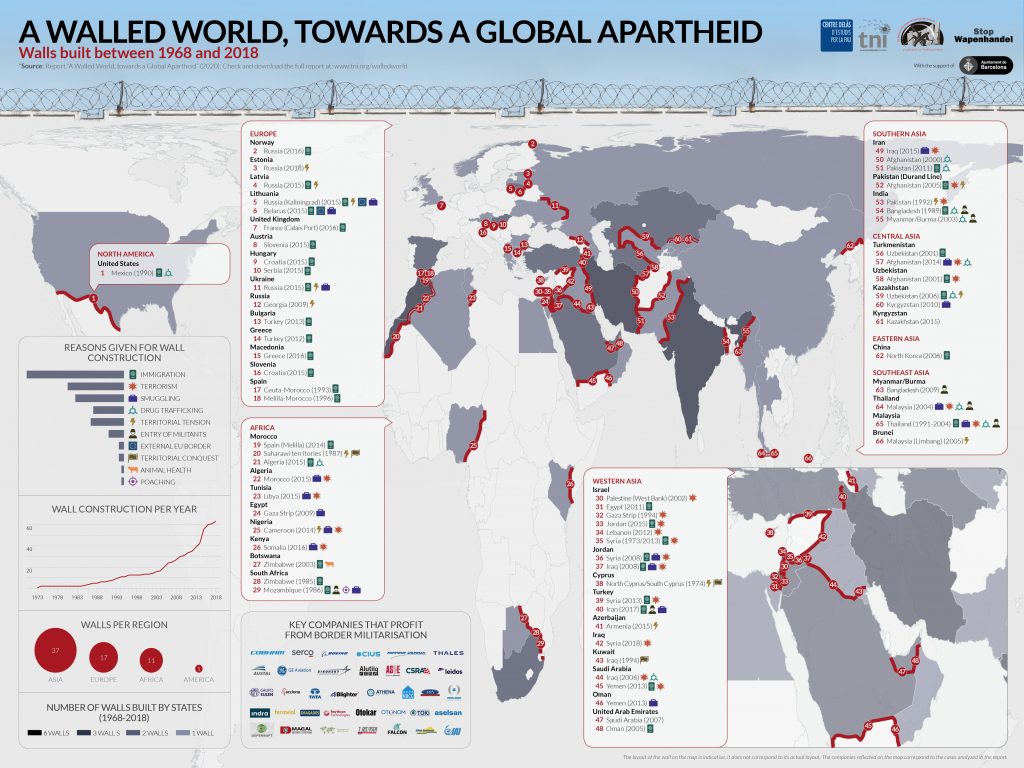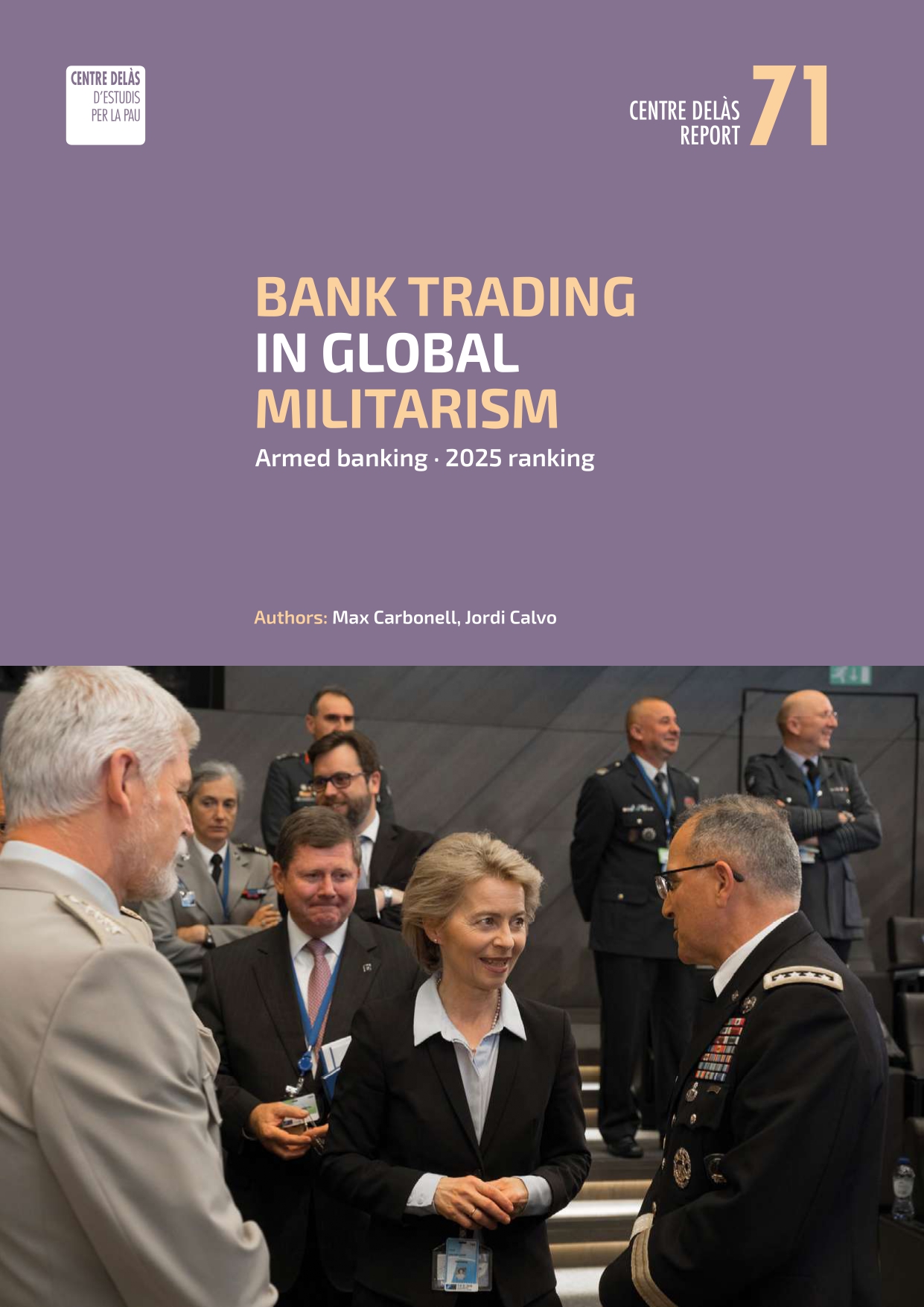6 out of 10 people worldwide live in a country that has built border walls
- 63 border walls have been built in the last 50 years (1968-2018)
- 60% of the walls were erected to prevent the entry of forcibly displaced persons.
- Europe is the region with the second highest numbers of walls (26% of the total), behind Asia which has more than half of the world’s walls (56% of the total).
- American, European and Israeli companies are the key companies that profit most from the wall construction business, including Airbus, Thales, Leonardo, Lockheed Martin, General Dynamics, Northrop Grumman, L3 Technologies, Elbit, Indra, Dat-Con, CSRA, Leidos and Raytheon.
Barcelona/Amsterdam, November 18th 2020. Days after the drawn-out U.S. elections, a new report reveals that the wall sold by Trump as a supposed achievement of his administration is just one of more than 63 new border walls built along borders or in occupied territories worldwide*. Today, 31 years after the fall of the Berlin Wall, we find ourselves in a world with more walls than ever. 4.679 billion people in the world (60.98%) live in a country that has built walls on its borders, concludes the report “Walled world: towards Global Apartheid” co published by the Centre Delàs d’Estudis per la Pau, Transnational Institute, Stop Wapenhandel and Stop the Wal Campaign.
Beyond the surge in physical walls, many more countries have militarized their frontiers through the deployment of troops, ships, aircraft, drones, and digital surveillance, patrolling land, sea and air. If we counted these ‘walls’, they would number hundreds. As a result, it is now more dangerous and deadly than ever to cross borders for people fleeing poverty and violence.
In addition, the research highlights that, as in the United States, immigration and terrorism are the main reasons given by states for the construction of walls, both justifications together represent 50%, half of the world’s walls.
Israel tops the list of countries that have built the most walls, with a total of 6. It is followed by Morocco, Iran and India with 3 walls each. Countries with 2 border walls are South Africa, Saudi Arabia, United Arab Emirates, Jordan, Turkey, Turkmenistan, Kazakhstan, Hungary and Lithuania.
“The global trend in border management policies is to build a world in which segregation and inequality are reinforced. In this walled world, commerce and capital are not restricted, yet it increasingly excludes people based on their class and origin”, states Ainhoa Ruiz Benedicto, co-author of the report and researcher at the Centre Delàs d’Estudis per la Pau.

The report focuses on a few specific walls in different regions, highlighting the following:
- Four of the five countries bordering Syria have built walls: Israel, Turkey, Jordan and Iraq.
- India has built 6,540 km of barriers against its neighboring countries, covering 43% of its borders.
- Morocco built an occupation wall with Western Sahara considered “the greatest functional military barrier in the world”, 2,720 km long.
In addition to physical walls, the militarization of border areas continues to increase, in which walls are just one means of stopping people crossing territories.. The report highlights two cases:
- Mexico has notably militarized its border with Guatemala with equipment and financing through the US funded Frontera Sur program.
- Australia has turned the sea into a barrier with the deployment of its armed forces and the Maritime Border Command of the Australian Border Force, in addition to an offshore detention system that violates human rights.
The business of building walls
Finally, the report analyzes the industry that profits from this surge in wall-building and the criminalization of people fleeing poverty and violence. The report concludes that the border security industry is diverse, as shown by the number of companies involved in the construction of Israel’s walls, with more than 30 companies from the military, security, technology and construction sectors.
“Many walls and fences are built by local construction companies or by state entities, such as the military. However, the walls are invariably accompanied by a range of technological systems, such as monitoring, detection and identification equipment, vehicles, aircraft and arms, which military and security firms provide”, explains Mark Akkerman, co-author of the report and researcher at Stop Wapenhandel. Companies such as Airbus, Thales, Leonardo, Lockheed Martin, General Dynamics, Northrop Grumman and L3 Technologies are the main beneficiaries of border contracts – in particular providing the technology that accompanies the walls in both the US and in EU member states. In the specific cases studied in the report, companies such as Elbit, Indra, Dat-Con, CSRA, Leidos and Raytheon also stand out as key contractors.
“Three decades after the fall of the Berlin Wall, it is extremely sad that the wall has become the symbol of our time. Not only is it a betrayal of people’s hopes in 1989, but it also locks us into a fortress with no way out in which we lose our very humanity. All the research tells us that we can expect more migration in the coming decades. Therefore, it is of profound importance to seek other dignified and humane ways to respond to the needs of people who are forced to flee their homes for reasons of poverty, violence and climate change”, warns Nick Buxton, co-editor of the report and researcher at TNI.
*It is important to note that most of the wall between Mexico and the United States was built not by Trump but rather during the administrations of George Bush and Barack Obama, as presented in the report More than a Wall (2019) by TNI.
Notes for editors
- You can read and download the full report A Walled World, towards a Global Apartheid here.
- You can download the infographics Walled World, towards a Global Apartheid in high resolution here.
- This report is the fourth edition of a series about walls, led by the Centre Delàs d’Estudis per la Pau in collaboration with TNI and Stop Wapenhandel. The first report was published in November 2018, Building Walls, and pointed the 1000 kilometers of walls in Europe, the second Business of Building Walls (November 2019) highlighted the companies involved in wall-construction in Europe and its third edition Guarding the Fortress (November 2019) analyzes the role of Frontex in border militarisation.
- Contacts for interviews:
- Ainhoa Ruiz Benedicto (Centre Delàs d’Estudis per la Pau) (Central Europe Time): aruiz@centredelas.org – +34 690 790 143 – +34 93 441 19 47
- Niamh Ni Bhriain (Transnational Institute TNI) (Central Europe Time): n.nibhriain@tni.org – +31 20 6626608
- Nick Buxton (Transnational Institute TNI) (Pacific Time): nick@tni.org – +1 530 902 3772




